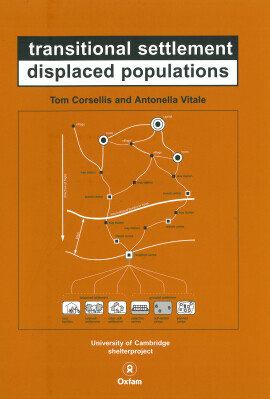
Transitional Settlement, Displaced Populations
Tom Corsellis, Antonella Vitale
It is often the national or regional coordinators of organisations who make decisions about whether to support the building of a refugee camp or to support refugees living with host families. Technical specialists, such as physical planners, are not always available until later on in the emergency. Compared with other sectors of response, there has been very little guidance to support coordinators and specialists in making these decisions. These guidelines, developed by Shelterproject.org at the University of Cambridge, will support coordinators and specialists in responding to transitional settlement and shelter needs of displaced populations and their hosts, improving appropriateness, quality, and sustainability. They will include best-practice strategic, programme, and project planning tools, in addition to a reference section. The book is accompanied by a free searchable CD-ROM, making this a flexible, portable, and accessible tool for fieldworkers. It will also be useful for planners and managers in Humanitarian programmes, especially those involved with shelter/protection, and also for students involved in planning, architecture and development studies courses; policy and research people in NGOs and government.
Published: 2005
Pages: 330
Paperback: 9780855985349
| Introduction | |||
|---|---|---|---|
| Part a: process | |||
| overview | |||
| introduction | |||
| terms | |||
| stakeholders | |||
| standards | |||
| legal context | |||
| livelihoods | |||
| strategy | |||
| planning | |||
| developing profiles | |||
| developing plans | |||
| phases of operation | |||
| general planning considerations | |||
| options | |||
| overview of transitional settlement options | |||
| dispersed in host families | |||
| dispersed in rural self-settlement | |||
| dispersed in urban self-settlement | |||
| grouped in collective centres | |||
| grouped in self-settled camps | |||
| grouped in planned camps | |||
| Part b: implementation | |||
| assessment | |||
| shelter assessment, monitoring, and evaluation (SAME) | |||
| step 1: why? | |||
| step 2: when? | |||
| step 3: what? | |||
| step 4: how? | |||
| labour | |||
| selecting and paying labour | |||
| self-help labour | |||
| direct labour | |||
| contracted labour | |||
| construction | |||
| profile and planning process | |||
| implementation | |||
| risks | |||
| climatic design | |||
| site management | |||
| plumbing and electrical services | |||
| materials procurement, storage, and use | |||
| construction from foundations to roof | |||
| distribution | |||
| distribution projects | |||
| shelter non-food item packages | |||
| distribution systems | |||
| procurement | |||
| shelter-material items | |||
| household shelter items | |||
| transit and camps | |||
| site selection | |||
| transit | |||
| camp programme planning | |||
| camp site planning | |||
| community development in camps | |||
| resources | |||
| glossary | |||
| acronyms | |||
| training | |||
| annotated resource list | |||
| bibliography and sources | |||
| index |
Tom Corsellis
Tom Corsellis is co-founder of shelterproject.org and the founder of aidworld.org. Tom is an architect, specialising in emergency shelter programmes and the physical planning of refugee camps. shelterproject.org, associated with the University of Cambridge for funded research projects, seeks to bring together people and information in this expanding sector of humanitarian response
Antonella Vitale
Antonella is Co Director at Shelter Center, Geneva, Switzerland





